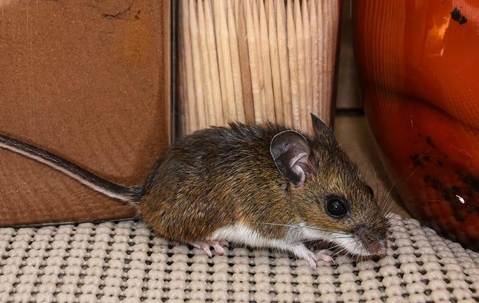When it gets cold in McKinney, rodents want to get inside to stay warm, spreading diseases and damaging the house or building they are in. Rodents, particularly mice and rats, can not only cause property damage but spread diseases as well, risking not only your home but the people in it.
Common Rodents in McKinney
Several common rodent species in McKinney have developed a dependent relationship with humans, relying on us for food, shelter, and water:
- Norway rats (Rattus norvegicus) are stocky and are 11 to 18 inches long, including the tail. Their body is gray with a lighter underside, with a tail that's hairless and dark on top and light on the underside and shorter than the body. Norway rats like basements and burrowing under structures and are not sociable. They do not like other Norway rats in their territory and will catch and kill both roof rats and house mice.
- Black rats/roof rats (Rattus rattus) are sleek and graceful. They are gray on top and have a pale-yellow underside. Their tails are longer than their body and do not have fur on them. The roof rat is 12 to 18 inches long, including the tail, and these rats like to climb and often live in the attic.
- House mice (Mus musculus) are grayish brown and have furless tail. They measure 5 to 8 inches long, including the tail. They will live anywhere they are sheltered, such as the attic, in a wall, or in clutter.
The Problems Rodents Can Cause in McKinney Homes
When rats and mice get into your McKinney home, they bring damage and disease with them. Norway and roof rats can cause rat leptospirosis, rat-bite fever, tularemia, and salmonellosis. House mice can cause several of those diseases, as well as lymphocytic choriomeningitis (LCM). These spread through urine and feces as rodents walk over food, food preparation areas, and food preparation utensils and contaminate everything they touch. They invade silos and grain storage buildings, outbuildings, and houses.
Like other rodents, these rats and mice have to chew to wear down their four front teeth. They do that by gnawing on wires, walls, pipes, mortar, wallboard, wood, clothing, and furniture. Rodents have been known to start fires by gnawing wires and letting them short out, which is yet another reason you want to keep them out of your home.
Why Are Rodents Coming Inside My McKinney Home Now?
Rodents are moving around and trying to make sure they have someplace warm and dry for the winter. They often invade houses during this time of year as part of that drive if there is food around, so much the better.
Rodent-Proofing Your House
Mice can use holes that are only ¼ inch in diameter to squeeze into a house. Rats take a little bigger hole, but both mice and rats will enlarge a hole to access buildings. Here are some things you can do to prevent mice and rats.
- Store food in glass or metal containers with a tight lid.
- Plug all holes in your foundation, walls, and roof with ¼ inch hardware cloth, steel wool, or cement.
- Fix all water leaks inside or outside.
- Pick up pet food at night.
- Mow grass and weeds.
- Outdoors, pile firewood or lumber on racks at least five inches off the ground and 20 feet away from walls.
- Remove brush and fallen trees and branches from the yard.
- Prune trees so they do not touch or hangover roofs and walls.
- Put trash in outdoor trash cans with tight-fitting lids.
Get Professional Help
Keeping rats and mice out of the house can be difficult any time of the year but is especially tough in the fall with winter coming on. Adams Exterminating can help. Our skilled technicians inspect your home and property and provide you with a home pest control treatment plan and estimate to treat your rodent problem. After the initial treatment, we will come back every other month to ensure the rodents do not return. Call Adams Exterminating today and get rid of those nasty rodents.

